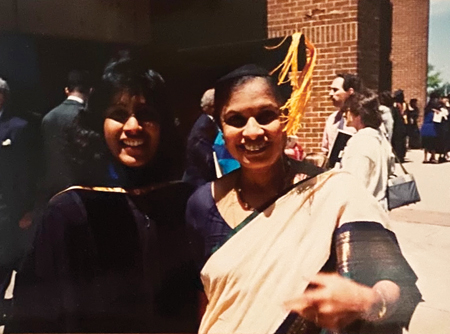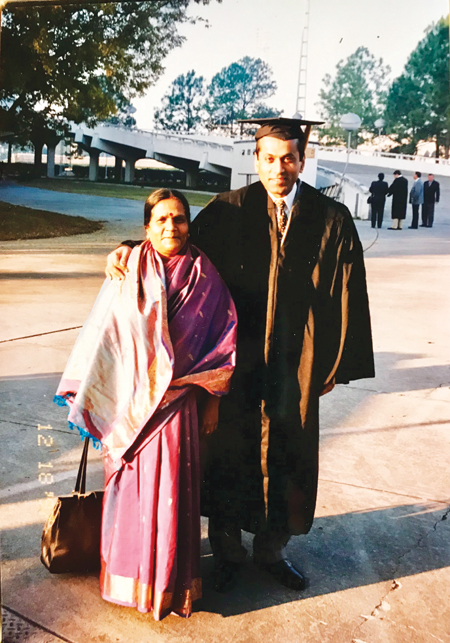Issues: On Parenting, a Journey That Never Ends

Seeing a shelf filled with parenting books at her public library, KALPANA GOWDA couldn’t resist stopping to review the titles. She remembered all of them. Having started her collection in 1998, she owned books on every parenting topic, from sleep training and baby sign language to books on driving, gifted education and, of course, college admissions. “The word ‘bittersweet’ comes to mind,” she says. “I’m always learning.”
I’m a licensed Counseling Psychologist who works with teens and young adults in middle Tennessee, where I grew up. More importantly, I’m the mother of three adult sons who have taught me more about parenting and myself than any book ever could. My reflections here come from mistakes made and proud moments that fill my heart with joy. The journey wasn’t perfect.
Do you remember The Lion King and the “Circle of Life” sung by Elton John?
From the day we arrive on this planet
And blinking, step into the sun
There’s more to see than can ever be seen
More to do than can ever be done
 These lyrics made sense to me when each of my sons was born, but the overwhelming surge of joy at their birth began to feel like an overwhelming tidal wave of anxiety as they started tackling their teenage milestones and eventually leaving for college. As we walked through those years together as a family, I stepped back from working with teens in my private practice and even in my volunteer work. I needed some time to focus on myself and try to understand all the mixed emotions I was having at the time. Here are some lessons I learned along the way.
These lyrics made sense to me when each of my sons was born, but the overwhelming surge of joy at their birth began to feel like an overwhelming tidal wave of anxiety as they started tackling their teenage milestones and eventually leaving for college. As we walked through those years together as a family, I stepped back from working with teens in my private practice and even in my volunteer work. I needed some time to focus on myself and try to understand all the mixed emotions I was having at the time. Here are some lessons I learned along the way.
[Right] The author with her mom in 1994
Let’s start with child development. In the early 1900s, Austrian psychiatrist Margaret Mahler wanted to explain early childhood development and introduced the term “separation-individuation” to explain the ways the parent-child bond evolved and impacted a child’s development. The term separation-individuation highlights a two-part dynamic between parent and child. A child moves from a dependent relationship with the mother to an independent one over time. The second word, individuation, is not as obvious. In order for a child to become an independent adult who can navigate life well, the parent must support and tolerate the child’s efforts to separate and eventually to leave the safety of home. At each step of separation, a child must feel that his or her parent is a calm, stable, and safe adult.
 At the beginning, separation and individuation are easy to promote and support. Who has not celebrated the moment when diapers, car seats, and umbrella strollers are not a part of packing for a trip to Publix or maybe India? The phrase, “Mommy, I can do it myself” is like music to your ears! As kids grow and begin to seek more independence away from home, this separation-individuation, also known as leaving and letting go, becomes much harder to tolerate. For some parents, the internal struggle begins early. I remember watching a good friend break down in tears on the first day of kindergarten on the way to the Boo Hoo Breakfast down the hall. Of course, we knew we would all be back within hours for pickup, but deep inside, we were all acknowledging an important, bittersweet milestone. This was not a drop off at daycare or the grandparents’ house; it was the beginning of a journey that would lead to college and adulthood. It signaled within each of our hearts that our child would be growing up and leaving us soon.
At the beginning, separation and individuation are easy to promote and support. Who has not celebrated the moment when diapers, car seats, and umbrella strollers are not a part of packing for a trip to Publix or maybe India? The phrase, “Mommy, I can do it myself” is like music to your ears! As kids grow and begin to seek more independence away from home, this separation-individuation, also known as leaving and letting go, becomes much harder to tolerate. For some parents, the internal struggle begins early. I remember watching a good friend break down in tears on the first day of kindergarten on the way to the Boo Hoo Breakfast down the hall. Of course, we knew we would all be back within hours for pickup, but deep inside, we were all acknowledging an important, bittersweet milestone. This was not a drop off at daycare or the grandparents’ house; it was the beginning of a journey that would lead to college and adulthood. It signaled within each of our hearts that our child would be growing up and leaving us soon.
[Left] The author’s husband with his mom in 1997
Parenting is full of transitions. There are highs and lows, endings and beginnings, graduations, disappointments, celebrations. It’s a mixture of sadness, joy, relief, anxiety connected to letting go—and truly bittersweet. Of course, most readers of this article know all about letting go. In the context of immigration, dropping off a child at kindergarten seems insignificant. But it’s an important transition in every parent’s life, and a preparation for the bigger transitions to come.
No transition is bigger than what follows high school. While there are different feelings associated with raising a teenager, there is nothing like college drop off to trigger a feeling of heartbreak. It’s a deeply personal and emotional journey. I call this transition “reverse childbirth” because it truly is a time that feels as physically, mentally, and emotionally unfamiliar as giving birth the first time. Everything changes.
More than four years ago, I returned to seeing teenagers in my private practice—and a few months from now, I will no longer be the parent of a teenager. I hope the tips I’m sharing here, both as a professional and a mother, will help other parents on their journey.
• Listen with an open mind. Be humble and curious. I entered parenting with a lot of confidence because I had an excellent parenting resume—or so I thought. I had lived a bicultural life, completed a master’s thesis on biculturation in Asian teens, trained in all adolescent settings during graduate school, and even co-led a summer camp for Indian kids at our temple. I also participated in Duke alumni interviewing and befriended many young desis growing up in our community. But guess what? My sons didn’t want an expert on adolescent development or bicultural identity. And they didn’t need a college counselor or mentor either. They needed a loving mom who was open to the digital world (iPhones, gaming, YouTubers, etc.) where they were finding their passion and motivation. I had traveled to college with a typewriter and was proud of our strict rules around technology. By not paying attention, I had held them back and strained our relationship. So now I listened with an open mind to understand their world.
• Build trust through actions and words. Notice what you say about other teens. Criticism and comparison add pressure. Stand by your child. Instead of “what will people say” or “what will people think,” try “I’m here for you” or “I’ll walk with you through this.” Be compassionate and kind in tough moments. We spend more than a decade with our kids teaching them lessons and shaping their behavior so they can succeed. In the last years of high school, there is a lot of pressure and expectation. Instead of making every setback or failure, a missed deadline, or their messy room a teaching moment, consider helping them out and providing support. It might be the middle of the night but consider saying, “I’m here . . . how can I help?” Finally, apologize. “I’m sorry, I was wrong” goes deep in the heart and mind of a young person.
 • Develop a calming, stress reduction practice. Running, walking, yoga, journaling, and spending time with close friends are a few of my favorite ways to decompress. Find ways to reduce your own internal pressure so that you can share that peace with your family. If you as a parent develop a calming practice, then everyone in the family will benefit. When everyone in a family is stressed, negative emotions tend to get magnified and become unbearable. When everyone knows how to calm down, especially the parents, then it’s so much easier to solve problems, resolve conflict, and communicate well.
• Develop a calming, stress reduction practice. Running, walking, yoga, journaling, and spending time with close friends are a few of my favorite ways to decompress. Find ways to reduce your own internal pressure so that you can share that peace with your family. If you as a parent develop a calming practice, then everyone in the family will benefit. When everyone in a family is stressed, negative emotions tend to get magnified and become unbearable. When everyone knows how to calm down, especially the parents, then it’s so much easier to solve problems, resolve conflict, and communicate well.
[Right] The author’s sons in 2023
•Seek professional help. There are SO MANY books, podcasts, YouTube videos, Facebook groups. Find a few parenting books for guidance and instructions on how to navigate whatever stage of parenting you are in now. There are experts who have spent years researching and developing their theories/strategies on how to best raise our wonderful teens. There are friends, relatives, trusted elders in the community who have already walked through these milestones with their own families. It may feel embarrassing or uncomfortable to ask for advice, but ask anyway. Consider therapy and medication. Therapy is effective. Sometimes, medication is exactly what a teen needs to help them cope and develop well. I have rarely met a person who regretted seeking mental health treatment, but I have spoken to many, many adults who wish they had considered therapy sooner. If you have any concerns about yourself or your child, please do not hesitate to try treatment. Denial and avoidance bring relief in the moment, but problems eventually show up somewhere and in someone. I see this every day.
• Have fun. Talk about ordinary, everyday stuff and limit how much you reference the future. Take part in enjoyable activities with your children. They know they are expected to do well and that you are worried about them. But not every conversation has to be serious and goal-driven.
• Acknowledge the Indian backpack. In the U.S., we are conscious of the achievements of Indians and their visibility as leaders in the corporate world and elsewhere. We are also known for pressure, conformity, high expectations, and a tendency towards competitiveness, gossip, and exclusion. Remember that kids are always navigating life with a multifaceted identity in a complex world. The backpack can be heavy. Try to alleviate the burden instead of adding to it.
Kalpana Gowda, PhD, lives in Nashville, where she is in private practice with a focus on traumatic loss and grief. She loves running, yoga, hiking/traveling with her husband, reading, and journaling. You can find her on Instagram @quietpointpsychotherapy.
Enjoyed reading Khabar magazine? Subscribe to Khabar and get a full digital copy of this Indian-American community magazine.
blog comments powered by Disqus










